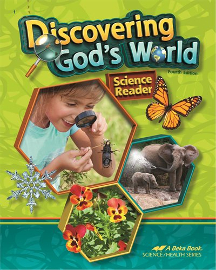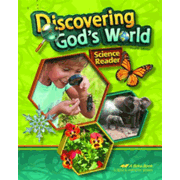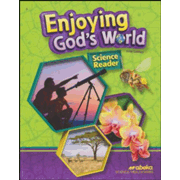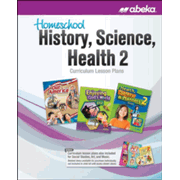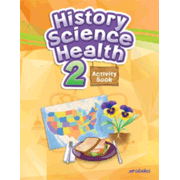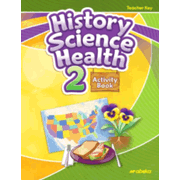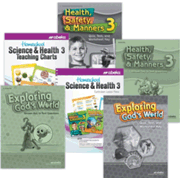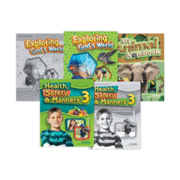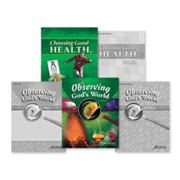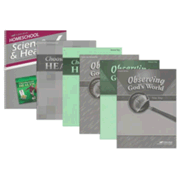A Beka's science program is written for a Christian audience as is clear from the titles of their books, such as Discovering God's World. All books are softcover and are printed in full color. Up through third grade, the student textbooks are intended to be consumable since they provide students with space to write answers to some questions and activities. Textbooks for fourth grade and above are non-consumable and have separate activity books or worksheets.
Topics are often repeated in these courses for the elementary grades although repeated information is presented at higher levels with more detail.
A Beka publishes health courses that are intended to be used along with their science courses.
Discovering God's World, fourth edition (Grade 1)
Discovering God's World is a consumable "science reader" that includes both information and activities. This 130-page book is heavily illustrated, and it is written in a way that makes it perfect for reading aloud. It frequently has questions that you can stop and discuss with your child in a casual fashion. It is written in the first person with language such as, "My eyes are one of God's wonderful gifts to me" (p. 12). A Beka's intent is that children start this course partway through the school year when they might be able to read some of it themselves.
The material is presented in units titled Discovering Myself (their features and their senses), Discovering My Toys (about forces and simple machines), Discovering Animals (mostly about baby animals), Discovering Insects, Discovering Plants, and Discovering Seasons. Each of the book's six units has three or more hands-on activities that should be easy to do. There are also some activities that students can complete in their books, such as drawing lines to match images of baby animals to their mothers, completing a three-word crossword puzzle, and coloring flowers by numbers. Some units include "Do You Remember?" pages with brief review questions.
The book can be used on its own without a teacher's guide. However, there are lesson plans for it within the Homeschool History, Science, and Health 1: Curriculum/Lesson Plans book. The lesson plans include answer keys.
It seems to me that it provides just the right amount of content for science at a time when math and language arts should take up the majority of your instructional time.
Enjoying God's World, fifth edition (Grade 2)
Enjoying God's World is also labeled as a "science reader" like the first-grade book. This 200-page textbook increases the amount of content and the level of difficulty. Comprehension activities have children match items, circle correct answers, and write words and sentences.
The units cover God as designer and creator, the human body, plants and trees, animals and their habitats, science investigations, how things work (forces, movement, simple machines, and states of matter), the atmosphere (air, weather, and the water cycle), earth, and space.
Rather than having a teacher's guide, this course's instructional information and the answer key for the textbook are contained in the Homeschool History, Science, and Health 2: Curriculum/Lesson Plans book. There is also a set of Homeschool History, Science, and Health 2 Teaching Charts, but you shouldn't need these.
There are quite a few written and hands-on activities in the student textbook. Some activities that are labeled "Be a Scientist!" introduce the scientific method to young students.
Many additional science activity pages are included in the History, Science, Health 2: Activity Book. These pages have puzzles, images to label, cut-and-paste activities, coloring, drawing, matching, and more. There's lots of variety. These activities reinforce lesson content, but they are not essential. A separate answer key is available for this book.
Exploring God's World, fifth edition (Grade 3)
Exploring God's World covers scientists and their work, physics, the atmosphere, the earth's surface, plants, the solar system, the animal kingdom, animal habitats, and the human body. Many of these topics were introduced in first or second grade, but they are taught here with expanded content in this 344-page textbook. For example, the chapter on physics covers forces, movements, and simple machines, topics that were introduced in second grade. For third grade, physics instruction expands to include the study of four energy sources (wind, water, solar, and fuel), types of energy, gears, compound machines, and foundations and supports for structures.
Hands-on activities, which are presented as "Something to Try," suggest experiments and observations that reinforce information taught in the lessons. Other hands-on activities, labeled "Be a Scientist!", introduce the scientific method.
Frequent Comprehension Checks with questions to answer are scattered throughout each of the textbook's nine chapters. Students can write their answers in the textbook. "Think About It!" sections ask students questions that are probably best used for discussion. You will almost certainly want to get Exploring God's World: Answer Key to Text Questions.
Exploring God's World: Quizzes, Tests, and Worksheets includes one worksheet, one quiz, and one test for each unit. Many of the worksheets are to be used with activities in the textbook. This book has its own separate answer key.
You might also want to use the My Animal Notebook that was created to be used with the third-grade science textbook. The notebook teaches students about animal classification as they personalize it with their own pictures and animal reports (which they will write). Instructions for creating this notebook are in Homeschool Science and Health 3: Curriculum/Lesson Plans, and it is not clear how you are to use the notebook without those instructions.
Understanding God's World, fourth edition (Grade 4)
Understanding God's World includes a wide range of topics: scientific method, insects, plants, birds, matter, energy, geology, oceanography, and astronomy. Comprehension questions for discussion are scattered throughout the book, and all except the first of the book's nine chapters have a Chapter Checkup at the end with questions to answer. Students need to write their answers elsewhere since they are not provided with space to write in their books. Understanding God's World: Answer Key has the answers to the textbook questions.
Most chapters have more than one hands-on activity. These are not too complicated and should all be usable in homeschool settings.
This textbook has significantly fewer pages than does the third-grade textbook—237 compared to 344. A major reason is that there are far fewer illustrations. In addition, the hands-on activities and other sidebar type items are presented in a condensed style. For instance, experiments take up about half as much space because they are explained with paragraphs rather than being laid out step by step as they are for third grade.
An unexpected feature of this textbook is the study of state birds which are presented one at a time throughout the course. Students are also introduced to state flowers as well as the birds and flowers for the Canadian provinces.
Understanding God's World: Activity Book has 44 activity pages. Among the activities are labeling, drawing, coloring, filling in blanks, puzzles, and nature hunts. Some pages require students to identify particular birds and flowers. A few of the pages that are labeled "Backyard Detective" send students outdoors to put checkmarks on a page for trees, flowers, and insects that they can find. This book has its own answer key.
Teaching information and instructions for coordinating the various course components are in the Homeschool Science and Health 4: Curriculum/Lesson Plans. There is a Quizzes & Tests book for the course, and it has its own answer key. The set of Homeschool Science 4-6 Teaching Charts might also be useful.
Investigating God's World, fourth edition (Grade 5)
Investigating God's World teaches students about insects, mammals, light, the earth, fossils, the sea, sea life, energy, engines, space, weather, and vertebrates. Many interesting sidebars throughout the textbook present intriguing information, hands-on activities, and short biographies of Christian scientists. Those sidebars include "Class Investigations" and "Private InvestiGators"—hands-on activities for which you will need supplies that you might not have on hand, such as liquid bluing, ammonia, and clay.
Comprehension Checks are scattered throughout each chapter, and there is a Chapter Checkup with questions at the end of each of the textbook's nine chapters.
Investigating God's World: Quizzes & Worksheets has 24 worksheets and 25 quizzes—more than one quiz per chapter. Tests are contained in a separate book. There are separate answer keys for the textbook, the quizzes and worksheets book, and the tests book.
Homeschool Science and Health 5: Curriculum/Lesson Plans coordinates the resources, but it is not essential. The optional set of Homeschool Science 4-6 Teaching Charts is also available.
Observing God's World, fourth edition (Grade 6)
Students study invertebrates, plants, Earth, the universe, space, matter, and introductory chemistry in this textbook. It includes Comprehension Checks throughout each chapter and a Chapter Checkup at the end of each of the six chapters. Hands-on activities are presented within boxes labeled as "Eyewitness Reporter" or "Student Observer." However, some of these are research or observation activities rather than actual hands-on experiments. Observing God's World: Answer Key has answers for all of the textbook questions.
Observing God's World: Quizzes & Worksheets has 25 quizzes and 22 worksheets to be used along with the textbook. Tests are in the separate Observing God's World: Tests booklet. Both books have their own, separate answer keys.
The Homeschool Science and Health 6: Curriculum/Lesson Plans has lesson plans for both the science and health texts for sixth grade, but it is not essential. The optional set of Homeschool Science 4-6 Teaching Charts is the same set used for grades four through six.





